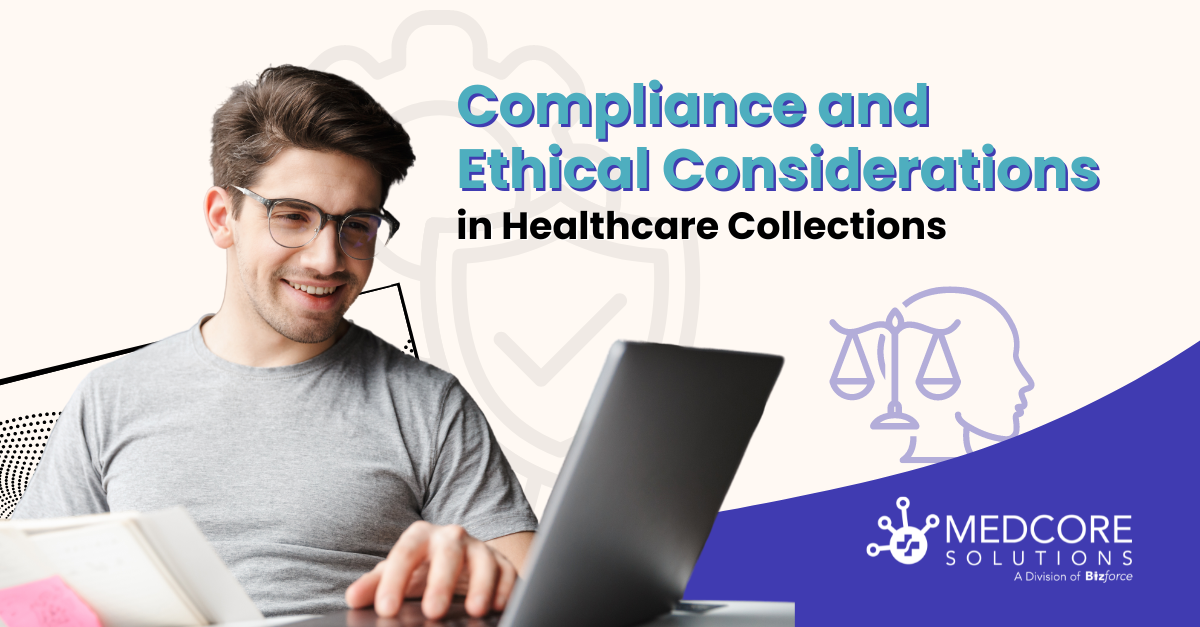Healthcare providers face severe penalties for non-compliance with regulations, with HIPAA violations alone carrying fines of up to $50,000 per incident. Navigating healthcare collections is a delicate and complex task. It requires a careful balance between recovering outstanding payments and preserving the trust and well-being of patients. In an industry where compassion and care are paramount, the payment collection process must adhere to the highest ethical standards and strict regulatory compliance. This blog will delve into the key compliance and ethical considerations in healthcare collections, underscoring the importance of protecting patient rights, ensuring transparency, and maintaining the integrity of healthcare institutions.
Understanding the Landscape of Healthcare Collections

The healthcare industry is unique in that it serves a dual purpose: providing critical medical care and managing financial operations. As healthcare costs continue to rise, the burden on both patients and healthcare providers has increased. There’s now a growing focus on the collection of unpaid medical bills.
Healthcare collections involve recovering payments from patients or their insurance providers for services rendered. This process can include billing, follow-up communications, and, in some cases, the involvement of third-party collection agencies. Given the sensitive nature of healthcare and the financial challenges faced by many patients, collections in this sector must be approached with a strong ethical foundation and strict adherence to compliance regulations.
Compliance Considerations in Healthcare Collections
Compliance in healthcare collections is not just about following the law. It’s also about ensuring that patients are treated fairly and respectfully throughout the collections process. Several key regulations govern healthcare collections, and understanding these is crucial for any healthcare provider or collections agency.
The Fair Debt Collection Practices Act (FDCPA)
The FDCPA is a federal law that protects consumers from abusive, unfair, or deceptive debt collection practices. While the FDCPA applies to third-party collection agencies rather than healthcare providers directly, it is essential for healthcare institutions to understand its provisions, especially if they outsource their collections activities.
Key Provisions of FDCPA
Prohibited Practices
The FDCPA prohibits practices such as harassment, making false statements, and threatening legal action that is not intended to be taken.
Patient Rights
Patients have the right to request verification of the debt and to dispute the debt if they believe it is incorrect.
Communication Restrictions
The act limits when and how often debt collectors can contact patients. Additionally, it prohibits contact at inconvenient times or places.
Therefore, healthcare providers must ensure that any third-party agencies they work with are compliant with the FDCPA and that their practices align with these standards to protect patients’ rights.
The Health Insurance Portability and Accountability Act (HIPAA)

HIPAA is a cornerstone of patient privacy and security in the healthcare industry. When handling healthcare collections, it is crucial to ensure that patient information is protected in accordance with HIPAA regulations.
Key Provisions of HIPAA
Protected Health Information (PHI)
Any information that can be used to identify a patient, such as names, addresses, medical records, and billing information, must be kept confidential and secure.
Minimum Necessary Rule
When sharing patient information for collections purposes, only the minimum necessary information should be disclosed to achieve the purpose.
Patient Consent
In some cases, patient consent may be required before their information can be shared with third-party collections agencies.
Healthcare providers must implement strict data security measures and ensure that all staff members are trained in HIPAA compliance to prevent unauthorized access to patient information during the collections process.
The Affordable Care Act (ACA)
The ACA introduced several provisions aimed at improving transparency and fairness in healthcare billing and collections. Healthcare providers must be aware of these requirements to ensure compliance.
Key Provisions of ACA
Plain Language Billing Statements
The ACA requires that billing statements be provided in plain language that is easy for patients to understand. This includes clearly itemizing charges and explaining the services rendered.
Limitations on Extraordinary Collection Actions
The ACA prohibits certain aggressive collections actions, such as reporting debt to credit agencies or initiating lawsuits, unless the provider has made reasonable efforts to determine whether the patient is eligible for financial assistance.
By complying with the ACA, healthcare providers can ensure that their billing and collections practices are transparent, fair, and aligned with the law.
Ethical Considerations in Healthcare Collections

Beyond compliance with legal requirements, healthcare providers must also consider the ethical implications of their collections practices. The way in which collections are handled can significantly impact the patient-provider relationship and the overall perception of the healthcare institution.
Compassionate Communication
Communication is at the heart of ethical healthcare collections. Patients who are struggling with medical debt are often experiencing significant stress and anxiety. As such, it is essential to approach collections with empathy and understanding.
Use Respectful Language
When communicating with patients about unpaid bills, use language that is respectful and non-confrontational. Avoid using terms that could be perceived as threatening or aggressive.
Listen to Patients
Take the time to listen to patients’ concerns and challenges. In many cases, patients may be willing to pay but are facing financial difficulties. Understanding their situation can help in finding a mutually agreeable solution.
Offer Payment Options
Providing flexible payment options, such as installment plans or sliding scale fees based on income, can make it easier for patients to pay their bills without compromising their financial stability.
Balancing Financial Responsibility with Patient Care
Healthcare providers have a dual responsibility to maintain financial viability while prioritizing patient care. This balance can be challenging, especially when dealing with unpaid bills. However, it is essential to ensure that the pursuit of collections does not overshadow the primary mission of healthcare: providing care.
Avoid Denying Care Due to Unpaid Bills
Ethically, it is important not to deny necessary care to patients based on their ability to pay. While financial sustainability is important, patient health and well-being must remain the top priority.
Provide Financial Counseling
Offering financial counseling services can help patients navigate their medical bills and understand their options. This support can prevent financial stress from interfering with their healthcare.
Transparency and Patient Education
Patients should fully understand their bills, the collections process, and their rights.
Clear Billing Statements
Ensure that billing statements are clear, detailed, and easy to understand. Patients should not be confused about what they are being charged for or why.
Educate Patients on Their Rights
Provide patients with information about their rights under the FDCPA, HIPAA, and ACA. This education can empower patients to engage in the collections process with confidence.
Conclusion
Healthcare collections is a complex and sensitive area that requires careful attention to both compliance and ethical considerations. By adhering to legal requirements and approaching collections with compassion, transparency, and respect, healthcare providers can protect patient rights, maintain the trust of their community, and uphold the integrity of their institution. Ultimately, ethical healthcare collections are not just about recovering payments. They are about ensuring that patients receive the care they deserve.
Ensure your healthcare collections process is handled with the utmost care and professionalism by partnering with MedCore’s expert medical collections specialists. Our team is dedicated to navigating the complexities of healthcare collections with compassion, compliance, and a commitment to protecting patient rights. With MedCore, you can maintain the trust of your community, uphold your institution’s integrity, and ensure that every patient is treated with the dignity and respect they deserve. Reach out to us today and elevate your collections process to the highest ethical standards. Click here.

